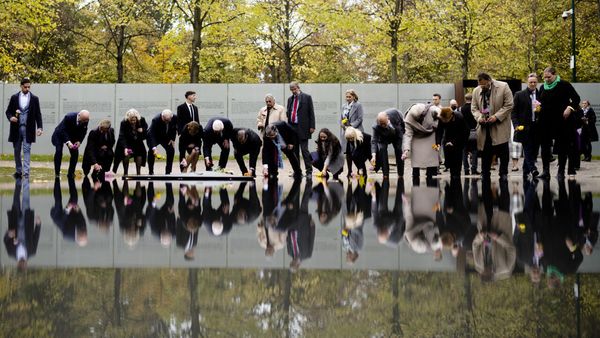Fred Guttenberg stood under a spotlight gripping a microphone with both hands and delivered a blunt message to Marco Rubio.
“I want to like you,” said Guttenberg, whose 14-year-old daughter was killed in a mass shooting at her high school last week. But he couldn’t. Not yet. Not after what he had heard.
“Your comments this week and those of our president have been pathetically weak,” Guttenberg continued, staring Rubio down as the crowd around him rose to applaud.
The Republican senator from Florida stood silent and expressionless as the weight of the moment washed over them both. For an instant, raw emotion was on display live on national television even as no words were spoken. An agonizing week crystallized in 20 long seconds.
“Look at me and tell me guns were the factor in the hunting of our kids in this school this week,” Guttenberg told him forcefully, gesturing with his left hand for emphasis. “And, look at me and tell me you accept it, and you will work with us to do something about guns.”
Rubio, who throughout his career has been a scripted and, at key moments, risk-averse politician, had thrust himself into a volatile and deeply personal discussion. Then, he took another unexpected step. He endorsed raising the age requirement for buying a rifle. Later, he said he was “reconsidering” his opposition to placing new limits on high-capacity magazines.
In doing so, Rubio stepped away from the pillars of the powerful gun rights movement that have long influenced the actions of most Republican members of Congress, including himself.
It was not a wholesale reversal. Rubio said he still didn’t favor an assault weapons ban. Nor was he ready to forsake donations from the National Rifle Association.
Still, it marked a potential inflection point in the way the Republican Party talks about guns and could apply new pressure on other GOP leaders to rethink their positions. At the same time, it held the possibility of alienating Rubio from his party’s base, which could have long-term implications for the former presidential hopeful, who friends and associates believe may run again someday.
The sudden development could hardly have come in a more tense setting: Rubio was surrounded by the people whose lives were forever changed by the shooting and who came to ask pointed questions with the eyes of the nation upon them.
For Rubio, the question is where he goes from here. After facing a torrent of criticism in recent days for not doing more to curb mass shootings and sometimes equivocating on gun policy, he has moved in a new direction. But time and again, Rubio has backed away from other controversial positions he has briefly occupied, raising questions about whether he will retreat from this one.
Wednesday night’s CNN town hall in Broward County, the site of last week’s deadly shooting, was a made-for-TV discussion that resembled the staging and atmospherics of televised town halls and presidential candidate debates that have become a fixture of the modern cable television news era.
Rubio and other invited guests, including Sen. Bill Nelson (D-Fla.) and Rep. Ted Deutch (D-Fla.), sat on stools on an elevated stage, surrounded by thousands of audience members. On stage was moderator Jake Tapper and a small group of students, teachers and parents.
Unlike the shouting matches that these kinds of forums tend to become, this one was direct yet respectful. Rubio unsurprisingly faced heated questions. Since the shooting, he had become the face of congressional inaction on tougher gun laws — a Republican who has sounded notes of compassion, while not straying from the party’s staunch support for largely preserving current gun laws.
That changed early in Wednesday’s program.
“I absolutely believe that in this country if you are 18 years of age, you should not be able to buy a rifle and I will support a law that takes that right away,” Rubio said, articulating a position that put him at odds with the NRA.
In a discussion with Chris Grady, a senior at Marjory Stoneman Douglas High School in Parkland, Fla., where the deadly shooting happened, Rubio explained his new thinking on ammunition capacity.
“I traditionally have not supported looking at magazine clip size. And after this, and some of the details I’ve learned about it, I’m reconsidering that position,” Rubio said. The crowd applauded.
“While it may not prevent an attack, it may save lives in an attack,” Rubio added.
In other ways, however, Rubio reaffirmed views that have angered gun-control advocates.
Cameron Kasky, a junior who survived the shooting, asked Rubio whether he would refuse donations from the NRA, which has spent more than $3 million on his behalf.
The crowd cheered. But Rubio stood solemn, with his hands first folded behind his back, then in front.
“People buy into my agenda,” Rubio said, reciting an oft-used talking point. He declined to say he would reject future money.
Kasky upped the ante, wagering that he could get people on hand to give Rubio as much money as the NRA would send him.
Rubio, appearing a bit more frustrated but still composed, would not budge.
“I will always accept the help of anyone who agrees with my agenda,” he said.
When Guttenberg spoke, he told Rubio, “My daughter running down the hallway at Marjory Stoneman Douglas was shot in the back.”
“Yes, sir,” Rubio replied.
“With an assault weapon,” Guttenberg said, “the weapon of choice.”
“Yes, sir,” Rubio said again.
“It is too easy to get. It is a weapon of war,” Guttenberg said. “The fact that you can’t stand with everybody in this building and say that, I’m sorry.”
“I do believe what you’re saying is true,” Rubio said, before explaining that he believes an assault weapons ban would be exploited by gun manufacturers.
“If you look at the law and its definition, it basically bans 200 models of gun — about 220 specific models of gun,” Rubio said.
But, he added, “it allows legal 2,000 other types of gun that are identical.”
“Are you saying you will start with the 200 and work your way up?” Guttenberg asked him.
Rubio wouldn’t commit to that — arguing that state assault weapons bans have failed to outlaw all such weapons.
“We instead should make sure that dangerous criminals, people that are deranged cannot buy any gun of any kind,” he said. “That’s what I believe a better answer will be.”
The crowd jeered and Guttenberg added, “Your answer speaks for itself.”
Even so, Rubio’s willingness to endure the contentious debate won him plaudits.
“Thank you @marcorubio for actually coming out it means a lot,” tweeted David Hogg, a student who survived the shooting.
“He had guts, coming here, when in fact there is no representative of the state of Florida — our governor did not come here, Governor Scott — but Marco did,” Nelson said.
Rubio has left himself wiggle room to back away from the new positions he adopted on Wednesday. In the past, he has done that, most notably on immigration, when he disavowed the comprehensive approach he once took as conservatives criticized him.
More recently, Rubio opened the door to voting against Rex Tillerson, President Trump’s pick for secretary of state. In the end, he stuck with his party and voted to confirm him.
Former Florida Republican congressman David Jolly noticed Rubio’s “shift on guns,” as he put it, taking to Twitter to underscore the dramatic, if not yet conclusive, change.
“If he pursues these,” Jolly wrote, “you can’t overlook it is a very strong departure from past rigid NRA positions.”







